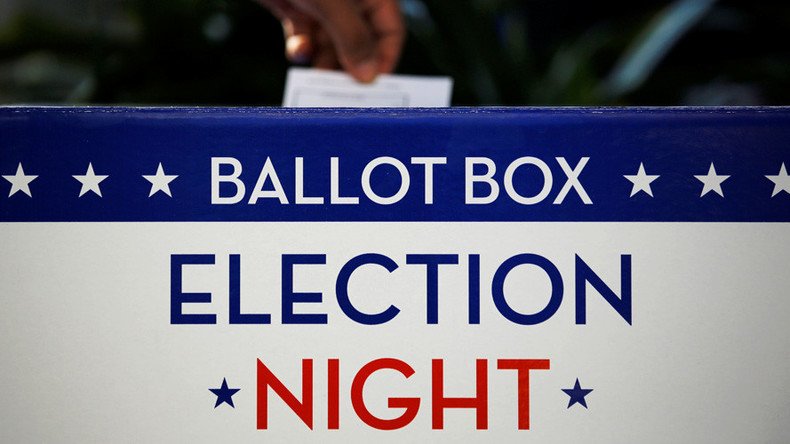Big victories for weed and wages

There were big victories for ballot measures legalizing marijuana and boosting the minimum wage across the US, as voters chose not only their president but policy as well.
Among the leading questions were whether to legalize marijuana, support gun control, and raise the minimum wage. Colorado now supports assisted suicide, and the state of Washington will limit access to guns for the mentally ill.
Legal Marijuana
In four states, voters approved recreational marijuana use, bringing the total number of states that have now legalized recreational pot to seven; a recent Gallup poll showed that close to 60 percent of Americans support the idea.
In Ballot Measures, Pot Legalization Makes Strides https://t.co/P4qVq3Qaqz
— NPR (@NPR) November 9, 2016
In California, 4.9 million people voted to approve legalizing marijuana in Proposition 64, or 55.8 percent, while more than 3.9 million voted against the measure, or 44.2 percent, according to Ballotpedia. Under the wide-reaching measure, Californians over the age of 21 can grow industrial hemp; it also establishes a 15 percent tax on sales. Medical marijuana is exempt from sales tax. The measure also authorizes re-sentencing and destruction of records for prior marijuana convictions.
With California voters supporting recreational use, pro-legalization groups are encouraged that it will lead to changes on the federal level.
“There is a massive sense of momentum, and this will put a lot of pressure on the federal government,” Ethan Nadelmann, founder of the nonprofit Drug Policy Alliance, a pro-legalization group, told AP.
In Maine, 50.2 percent of voters, or more than 376,000 people, said ‘yes’ to legalizing marijuana, with 49.8 percent, or more than 373,000, voters against the measure. Under the measure, those aged 21 and over can possess, use or transport limited amounts of marijuana. Licensed facilities can produce and sell the drug, and it establishes a 10 percent tax on sales.
In Massachusetts, 1.7 million voters approved a measure to legalize marijuana, or 53.6 percent of the vote. Under the measure, residents can use, distribute and cultivate marijuana over the age of 21. It would also be taxed.
Nevada residents also approved a measure to legalize recreational marijuana, receiving approval from 54.5 percent of voters, or more than 600,000 people. There would also be a 15 percent tax on wholesale marijuana sales. Net revenue would go towards education.
Over one million people in Arizona voted ‘no’ against Proposition 205, or 52.1 percent, which would have legalized the consumption and growth of limited amounts of marijuana for those 21 and older. Just under a million voted ‘yes,’ or 47.9 percent
Minimum wage
More than 1.1 million people in Arizona voted to increase the minimum wage from $10 per hour to $12 per hour by 2020, or 59 percent. The measure also required employers to provide paid sick leave, 40 hours per year for large employers, and 24 hours per year for smaller employers. Over 700,000 voted against the measure, or 41 percent.
In Colorado, 1.2 million citizens voted ‘yes’ on amendment 70 to increase the minimum wage. The measure will increase the minimum wage to $9.30 by January 1, 2017, and gradually raise it to $12 per hour by January 2020.
Good summary on results of ballot initiatives with #publichealth implications. https://t.co/fI4vgpn0xJ#phlaw
— Donna Levin (@LevinNetworkPHL) November 9, 2016
More than half of the voters in Maine (55.5 percent, or over 414,000 people) approved a measure to increase the minimum wage from $9 in 2017 to $12 per hour in 2020. Over 330,000 voted against the measure, or 44.5 percent
Washington state’s minimum wage will rise to $11 per hour in 2017, and gradually rise to $13.50 by 2020, as approved by 58.8 percent of the vote, or over 1.2 million voters.
Gun control
Mainers did not support a measure that would require background checks or sales by non-licensed dealers, with 52 percent of voters voting ‘no,’ and 48 percent voting ‘yes’.
Nevada voters voted ‘yes’ to background checks on sales by non-licensed dealers, with the measure receiving 50.4 percent of the vote. There is an exemption under the measure allowing for the transfer of guns between family members for hunting and immediate self-defense. The vote was close, however, with 49.6 percent voting ‘no.’
Gun control-related ballot measures are expected to win in four states today. More here: https://t.co/oZN5fvvnstpic.twitter.com/NztWuqpCIk
— Reuters Top News (@Reuters) November 8, 2016
Washington state approved a measure that would allow police, family, or household members to obtain court orders that would temporarily ban people from obtaining firearms who exhibit violent behavior or mental illness. The measure passed with 70.6 percent of the vote, or over 1.5 million votes, with just 29.4 percent voting against the measure, or over 600,000.
High on the ballot: 9 US states voting to legalize marijuana https://t.co/wY1NEaRnuO
— RT America (@RT_America) November 6, 2016
Assisted suicide
Voters in Colorado passed a measure to allow physician-assisted suicide for the terminally ill by a ‘yes’ vote that received over 1.5 million votes, or 64.6 percent. The ‘no’ polled 35.4 percent, or over 800,000.











